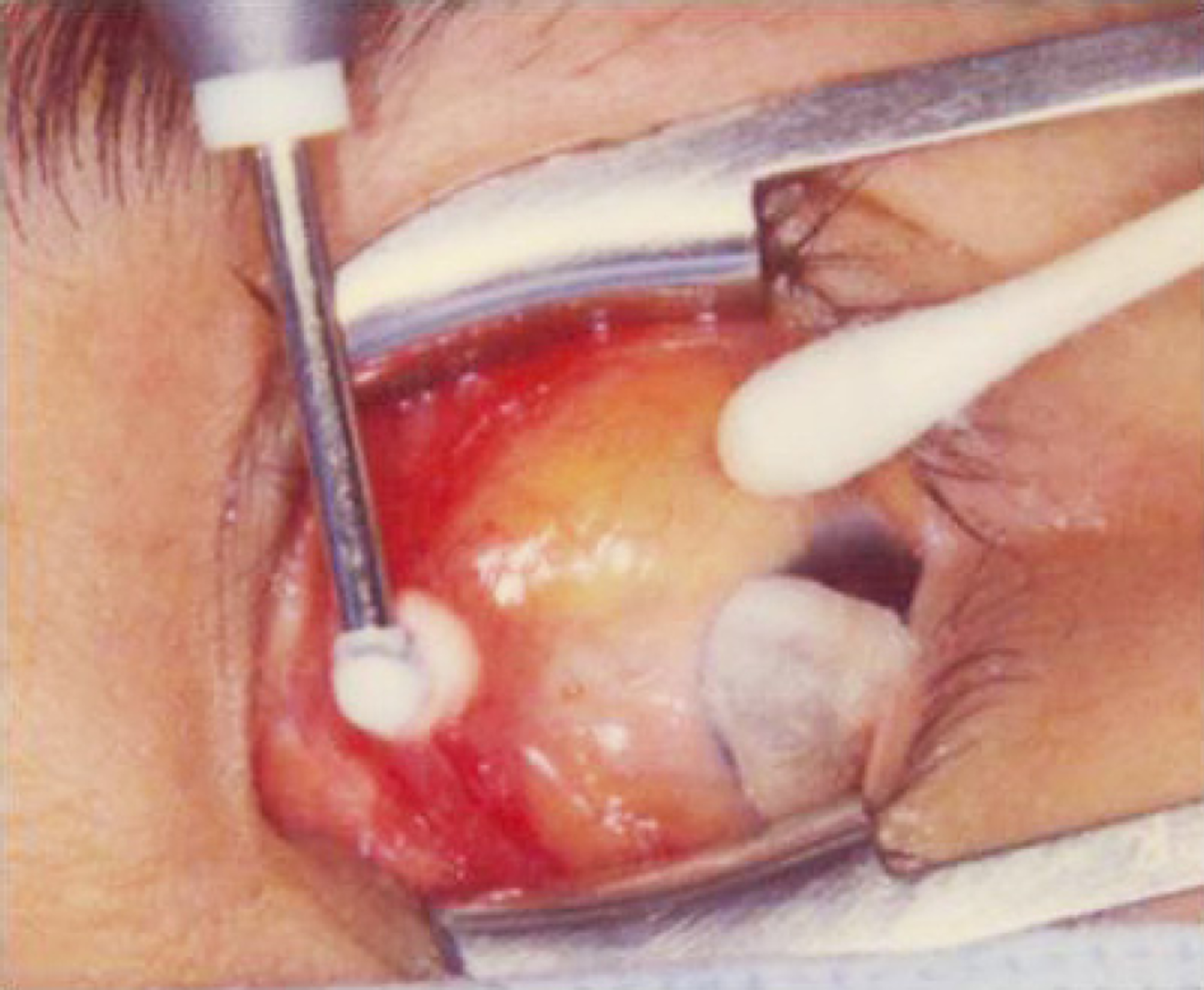J Korean Ophthalmol Soc.
2015 Nov;56(11):1653-1660. 10.3341/jkos.2015.56.11.1653.
Long-Term Outcomes after Cryotherapy for Conjunctival Mucosa-Associated Lymphoid Tissue Lymphomas
- Affiliations
-
- 1Department of Ophthalmology, Catholic University of Daegu School of Medicine, Daegu, Korea. kimkh@cu.ac.kr
- KMID: 2214170
- DOI: http://doi.org/10.3341/jkos.2015.56.11.1653
Abstract
- PURPOSE
To evaluate long-term outcomes after cryotherapy for conjunctival mucosa-associated lymphoid tissue (MALT) lymphomas.
METHODS
We retrospectively analyzed 11 eyes of 8 patients who underwent cryotherapy with a confirmed histopathological diagnosis of conjunctival MALT lymphoma between January 2006 and December 2010 and were followed up for at least a year.
RESULTS
The mean patient age was 36.8 years and the average follow-up was 4.1 years. Complete remission was achieved in 3 patients (4 eyes) and recurrence occurred in 5 patients (7 eyes) after the first cryotherapy. After the third cryotherapy, complete remission was achieved in 2 patients (2 eyes) and recurrence occurred in 3 patients (5 eyes). Therefore, 3 patients (5 eyes) underwent radiotherapy and finally achieved complete remission. After cryotherapy, significant complications were not observed except mild symblepharon in 4 patients (6 eyes).
CONCLUSIONS
Cryotherapy, although having a higher recurrence rate than radiotherapy, is a simple treatment modality with fewer complications for patients. In the conjunctival MALT lymphoma patients who cannot undergo radiotherapy, cryotherapy should be considered as an alternative treatment modality.
MeSH Terms
Figure
Reference
-
References
1. Freeman C, Berg JW, Cutler SJ. Occurrence and prognosis of ex-tranodal lymphomas. Cancer. 1972; 29:252–60.
Article2. Lee YS, Lee MI, Park TS, Lee SY. The prognosis of ocular-adnexal lymphoproliferative lesions. J Korean Ophthalmol Soc. 2003; 44:1260–7.3. Shields CL, Shields JA, Carvalho C. . Conjunctival lymphoid tumors: clinical analysis of 117 cases and relationship to systemic lymphoma. Ophthalmology. 2001; 108:979–84.4. Cho EY, Han JJ, Ree HJ. . Clinicopathologic analysis of ocular adnexal lymphomas: extranodal marginal zone b-cell lymphoma constitutes the vast majority of ocular lymphomas among Koreans and affects younger patients. Am J Hematol. 2003; 73:87–96.
Article5. Jakobiec FA, Knowles DM. An overview of ocular adnexal lym-phoid tumors. Trans Am Ophthalmol Soc. 1989; 87:420–42. dis-cussion 442-4.6. Zhou P, Ng AK, Silver B. . Radiation therapy for orbital lymphoma. Int J Radiat Oncol Biol Phys. 2005; 63:866–71.
Article7. Le QT, Eulau SM, George TI. . Primary radiotherapy for lo-calized orbital MALT lymphoma. Int J Radiat Oncol Biol Phys. 2002; 52:657–63.
Article8. Ji JY, Ahn YC, Kim YD. Radiotherapy for malignant lymphoma of orbit and ocular adnexa. J Korean Ophthalmol Soc. 2005; 46:201–14.9. Isaacson P, Wright DH. Malignant lymphoma of mucosa-asso-ciated lymphoid tissue. A distinctive type of B-cell lymphoma. Cancer 1983:52. 1410–6.
Article10. Knowles DM, Jakobiec FA, McNally L, Burke JS. Lymphoid hy-perplasia and malignant lymphoma occurring in the ocular adnexa (orbit, conjunctiva, and eyelids): a prospective multiparametric analysis of 108 cases during 1977 to 1987. Hum Pathol. 1990; 21:959–73.
Article11. Johnson TE, Tse DT, Byrne GE Jr. . Ocular-adnexal lymphoid tumors: a clinicopathologic and molecular genetic study of 77 patients. Ophthal Plast Reconstr Surg. 1999; 15:171–9.12. Shields CL, Shields JA, Eagle RC. Clinicopathologic reports, case reports, and small case series: rapidly progressive T-cell lympho-ma of the conjunctiva. Arch Ophthalmol. 2002; 120:508–9.13. Al-Muammar A, Hodge WG, Farmer J. Conjunctival T-cell lym-phoma: a clinicopathologic case report. Ophthalmology. 2006; 113:459–61.14. Dunbar SF, Linggood RM, Doppke KP. . Conjunctival lym-phoma: results and treatment with a single anterior electron field. A lens sparing approach. Int J Radiat Oncol Biol Phys. 1990; 19:249–57.
Article15. Jereb B, Lee H, Jakobiec FA, Kutcher J. Radiation therapy of con-junctival and orbital lymphoid tumors. Int J Radiat Oncol Biol Phys. 1984; 10:1013–9.
Article16. Vitu L, Girinsky T, Briot E, Cosset JM. Electron beam irradiation of conjunctival lymphomas. Int J Radiat Oncol Biol Phys. 1991; 21:1107–8.
Article17. Bhatia S, Paulino AC, Buatti JM. . Curative radiotherapy for primary orbital lymphoma. Int J Radiat Oncol Biol Phys. 2002; 54:818–23.
Article18. Erickson BA, Harris GJ, Enke CA. . Periocular lymphoproli-ferative diseases: natural history, prognostic factors, and treatment. Radiology. 1992; 185:63–70.
Article19. Xicoy B, Ribera JM, Arellano A. . Effectiveness of local radio-therapy in primary extranodal marginal zone B-cell lymphoma of MALT or MALT lymphoma of conjunctiva: study of four cases. Leuk Lymphoma. 2002; 43:1975–7.
Article20. Stafford SL, Kozelsky TF, Garrity JA. . Orbital lymphoma: ra-diotherapy outcome and complications. Radiother Oncol. 2001; 59:139–44.
Article21. Tsai PS, Colby KA. Treatment of conjunctival lymphomas. Semin Ophthalmol. 2005; 20:239–46.
Article22. Ellis JH, Banks PM, Campbell RJ, Liesegang TJ. Lymphoid tu-mors of the ocular adnexa. Clinical correlation with the working formulation classification and immunoperoxidase staining of par-affin sections. Ophthalmology. 1985; 92:1311–24.23. Liao SL, Kao SC, Hou PK, Chen MS. Results of radiotherapy for orbital and adnexal lymphoma. Orbit. 2002; 21:117–23.
Article24. Martinet S, Ozsahin M, Belkacémi Y. . Outcome and prog-nostic factors in orbital lymphoma: a Rare Cancer Network study on 90 consecutive patients treated with radiotherapy. Int J Radiat Oncol Biol Phys. 2003; 55:892–8.25. Eichler MD, Fraunfelder FT. Cryotherapy for conjunctival lym-phoid tumors. Am J Ophthalmol. 1994; 118:463–7.
Article26. Tucker SM, Hurwitz JJ, Pavlin CJ. . Scleral melt after cry-otherapy for conjunctival melanoma. Ophthalmology. 1993; 100:574–7.
Article
- Full Text Links
- Actions
-
Cited
- CITED
-
- Close
- Share
- Similar articles
-
- Two Cases of Conjunctival Mucosa-associated Lymphoid Tissue (MALT) Lymphomas Treated by Cryotherapy
- Primary Conjunctival Malignant Lymphoma of Mucosa-Associated Lymophoid Tissue
- Malignant Lymphoma of Mucosa-associated Lymphoid Tissue Arising in the Conjunctiva
- Helicobacter pylori-negative Gastric Mucosa-associated Lymphoid Tissue Lymphoma
- A case report of the Pulmonary Malignant Lymphomaof the mucosa-associated lymphoid tissue(MALT)






